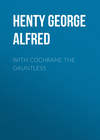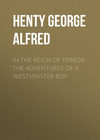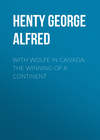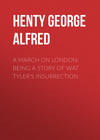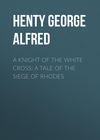Buch lesen: «Saint Bartholomew's Eve: A Tale of the Huguenot Wars», Seite 3
"He has been well taught, and will do no discredit to our race, Monsieur Bertram. His father is a strong and powerful man, even for an Englishman; and though Philip does not follow his figure, he has something of his strength."
"They are wondrous strong, these Englishmen," the trader said. "I have seen, among their sailors, men who are taller by a head than most of us here, and who look strong enough to take a bull by the horns and hold him. But had it not been for your nephew's fair hair and gray eyes, his complexion, and the smile on his lips–we have almost forgotten how to smile, in France–I should hardly have taken him for an Englishman."
"There is nothing extraordinary in that, Monsieur Bertram, when his mother is French, and he has lived greatly in the society of my husband and myself, and among the Huguenot colony at Canterbury."
"Have you succeeded in getting the horses and the four men for us, Monsieur Bertram?" Philip asked.
"Yes, everything is in readiness for your departure tomorrow. Madame will, I suppose, ride behind you upon a pillion; and her maid behind one of the troopers.
"I have, in accordance with Monsieur Vaillant's instructions, bought a horse, which I think you will be pleased with; for Guise himself might ride upon it, without feeling that he was ill mounted. I was fortunate in lighting on such an animal. It was the property of a young noble, who rode hither from Navarre and was sailing for England. I imagine he bore despatches from the queen to her majesty of England. He had been set upon by robbers on the way. They took everything he possessed, and held him prisoner, doubtless meaning to get a ransom for him; but he managed to slip off while they slept, and to mount his horse, with which he easily left the varlets behind, although they chased him for some distance. So when he came here, he offered to sell his horse to obtain an outfit and money for his voyage; and the landlord of the inn, who is a friend of mine, knowing that I had been inquiring for a good animal, brought him to me, and we soon struck a bargain."
"It was hard on him to lose his horse in that fashion," Philip said; "and I am sorry for it, though I may be the gainer thereby."
"He did not seem to mind much," the merchant said. "Horses are good and abundant in Navarre, and when I said I did not like to take advantage of his strait, he only laughed and said he had three or four others as good at home. He did say, though, that he would like to know if it was to be in good hands. I assured him that on that ground he need not fear; for that I had bought it for a young gentleman, nearly related to the Countess de Laville. He said that was well, and seemed glad, indeed, that it was not to be ridden by one of the brigands into whose hands he fell."
"And the men. Are they trustworthy fellows?"
"They are stout men-at-arms. They are Gascons all, and rode behind Coligny in the war, and according to their own account performed wonders; but as Gascons are given to boasting, I paid not much heed to that. However, they were recommended to me by a friend, a large wine grower, for whom they have been working for the last two years. He says they are honest and industrious, and they are leaving him only because they are anxious for a change and, deeming that troubles were again approaching, wanted to enter the service of some Huguenot lord who would be likely to take the field. He was lamenting the fact to me, when I said that it seemed to me they were just the men I was in search of; and I accordingly saw them, and engaged them on the understanding that, at the end of a month, you should be free to discharge them if you were not satisfied with them; and that equally they could leave your service, if they did not find it suit.
"They have arms, of course, and such armour as they need; and I have bought four serviceable horses for their use, together with a horse to carry your baggage, but which will serve for your body servant.
"I have not found a man for that office. I knew of no one who would, as I thought, suit you; and in such a business it seemed to me better that you should wait, and choose for yourself, for in the matter of servants everyone has his fancies. Some like a silent knave, while others prefer a merry one. Some like a tall proper fellow, who can fight if needs be; others a staid man, who will do his duty and hold his tongue, who can cook a good dinner and groom a horse well. It is certain you will never find all virtues combined. One man may be all that you wish, but he is a liar; another helps himself; a third is too fond of the bottle. In this matter, then, I did not care to take the responsibility, but have left it for you to choose for yourself."
"I shall be more likely to make a mistake than you will, Monsieur Bertram," Philip said with a laugh.
"Perhaps so, but then it will be your own mistake; and a man chafes less, at the shortcomings of one whom he has chosen himself, than at those of one who has, as it were, been forced upon him."
"Well, there will be no hurry in that matter," Philip said. "I can get on well enough without a servant, for a time. Up to the present, I have certainly never given a thought as to what kind of man I should want as a servant; and I should like time to think over a matter which is, from what you say, so important."
"Assuredly it is important, young sir. If you should take the field, you will find that your comfort greatly depends upon it. A sharp, active knave, who will ferret out good quarters for you, turn you out a good meal from anything he can get hold of, bring your horse up well groomed in the morning, and your armour brightly polished; who will not lie to you overmuch, or rob you overmuch, and who will only get drunk at times when you can spare his services. Ah! He would be a treasure to you. But assuredly such a man is not to be found every day."
"And of course," Marie put in, "in addition to what you have said, Monsieur Bertram, it would be necessary that he should be one of our religion, and fervent and strong in the faith."
"My dear lady, I was mentioning possibilities," the trader said. "It is of course advisable that he should be a Huguenot, it is certainly essential that he should not be a Papist; but beyond this we need not inquire too closely. You cannot expect the virtues of an archbishop, and the capacity of a horse boy. If he can find a man embracing the qualities of both, by all means let your son engage him; but as he will require him to be a good cook, and a good groom, and he will not require religious instruction from him, the former points are those on which I should advise him to lay most stress.
"And now, Madame Vaillant, will you let me lead you into the next room where, as my daughter has for some time been trying to make me understand, a meal is ready? And I doubt not that you are also ready; for truly those who travel by sea are seldom able to enjoy food, save when they are much accustomed to voyaging. Though they tell me that, after a time, even those with the most delicate stomachs recover their appetites, and are able to enjoy the rough fare they get on board a ship."
After the meal was over, the merchant took Philip to the stables, where the new purchases had been put up. The men were not there, but the ostler brought out Philip's horse, with which he was delighted.
"He will not tire under his double load," the merchant said; "and with only your weight upon him, a foeman would be well mounted, indeed, to overtake you."
"I would rather that you put it, Monsieur Bertram, that a foeman needs be well mounted to escape me."
"Well, I hope it will be that way," his host replied, smiling. "But in fighting such as we have here, there are constant changes. The party that is pursued one day is the pursuer a week later; and of the two, you know, speed is of much more importance in flight than in pursuit. If you cannot overtake a foe, well, he gets away, and you may have better fortune next time; but if you can't get away from a foe, the chances are you may never have another opportunity of doing so."
"Perhaps you are right. In fact, now I think of it, I am sure you are; though I hope it will not often happen that we shall have to depend for safety on the speed of our horses. At any rate, I am delighted with him, Monsieur Bertram; and I thank you greatly for procuring so fine an animal for me. If the four men turn out to be as good, of their kind, as the horse, I shall be well set up, indeed."
Early the next morning the four men came round to the merchant's, and Philip went down with him into the entry hall where they were. He was well satisfied with their appearance. They were stout fellows, from twenty-six to thirty years old. All were soberly dressed, and wore steel caps and breast pieces, and carried long swords by their sides. In spite of the serious expression of their faces, Philip saw that all were in high, if restrained, spirits at again taking service.
"This is your employer, the Sieur Philip Fletcher. I have warranted that he shall find you good and true men, and I hope you will do justice to my recommendation."
"We will do our best," Roger, the eldest of the party, said. "We are all right glad to be moving again. It is not as if we had been bred on the soil here, and a man never takes to a strange place as to one he was born in."
"You are Gascons, Maitre Bertram tells me," Philip said.
"Yes, sir. We were driven out from there ten years ago, when the troubles were at their worst. Our fathers were both killed, and we travelled with our mothers and sisters by night, through the country, till we got to La Rochelle."
"You say both your fathers. How are you related to each other?"
"Jacques and I are brothers," Roger said, touching the youngest of the party on his shoulder. "Eustace and Henri are brothers, and are our cousins. Their father and ours were brothers. When the troubles broke out, we four took service with the Count de Luc, and followed him throughout the war. When it was over we came back here. Our mothers had married again. Some of our sisters had taken husbands, too. Others were in service. Therefore we remained here rather than return to Gascony, where our friends and relations had all been either killed or dispersed.
"We were lucky in getting employment together, but were right glad when we heard that there was an opening again for service. For the last two years we have been looking forward to it; for as everyone sees, it cannot be long before the matter must be fought out again. And in truth, we have been wearying for the time to come; for after having had a year of fighting, one does not settle down readily to tilling the soil.
"You will find that you can rely on us, sir, for faithful service. We all bore a good reputation as stout fighters and, during the time we were in harness before, we none of us got into trouble for being overfond of the wine pots."
"I think you will suit me very well," Philip said, "and I hope that my service will suit you. Although an Englishman by birth and name, my family have suffered persecution here as yours have done, and I am as warmly affected to the Huguenot cause as yourselves. If there is danger you will not find me lacking in leading you, and so far as I can I shall try to make my service a comfortable one, and to look after your welfare.
"We shall be ready to start in half an hour, therefore have the horses round at the door in that time. One of the pillions is to be placed on my own horse. You had better put the other for the maid behind your saddle, Roger; you being, I take it, the oldest of your party, had better take charge of her."
The men saluted and went out.
"I like their looks much," Philip said to the merchant. "Stout fellows and cheerful, I should say. Like my aunt, I don't see why we should carry long faces, Monsieur Bertram, because we have reformed our religion; and I believe that a light heart and good spirits will stand wear and tear better than a sad visage."
The four men were no less pleased with their new employer.
"That is a lad after my own heart," Roger said, as they went out. "Quick and alert, pleasant of face; and yet, I will be bound, not easily turned from what he has set his mind to. He bears himself well, and I doubt not can use his weapons. I don't know what stock he comes from, on this side, but I warrant it is a good one.
"He will make a good master, lads. I think that, as he says, he will be thoughtful as to our comforts, and be pleasant and cheerful with us; but mind you, he will expect the work to be done, and you will find that there is no trifling with him."
Chapter 3: In A French Chateau
The three days' ride to the chateau of the Countess de Laville was marked by no incident. To Philip it was an exceedingly pleasant one. Everything was new to him; the architecture of the churches and villages, the dress of the people, their modes of agriculture, all differing widely from those to which he was accustomed. In some villages the Catholics predominated, and here the passage of the little party was regarded with frowning brows and muttered threats; by the Huguenots they were saluted respectfully, and if they halted, many questions were asked their followers as to news about the intentions of the court, the last rumours as to the attitude of Conde, and the prospects of a continuance of peace.
Here, too, great respect was paid to Marie and Philip when it was known they were relatives of the Countess de Laville, and belonged to the family of the De Moulins. Emilie had for some time been a widow–the count, her husband, having fallen at the battle of Dreux, at the end of the year 1562–but being an active and capable woman, she had taken into her hands the entire management of the estates, and was one of the most influential among the Huguenot nobles of that part of the country.
From their last halting place, Marie Vaillant sent on a letter by one of the men to her sister, announcing their coming. She had written on her landing at La Rochelle, and they had been met on their way by a messenger from the countess, expressing her delight that her sister had at last carried out her promise to visit her, and saying that Francois was looking eagerly for the coming of his cousin.
The chateau was a semi-fortified building, capable of making a stout resistance against any sudden attack. It stood on the slope of a hill, and Philip felt a little awed at its stately aspect as they approached it. When they were still a mile away, a party of horsemen rode out from the gateway, and in a few minutes their leader reined up his horse in front of them and, springing from it, advanced towards Philip, who also alighted and helped his aunt to dismount.
"My dear aunt," the young fellow said, doffing his cap, "I am come in the name of my mother to greet you, and to tell you how joyful she is that you have, at last, come back to us.
"This is my Cousin Philip, of course; though you are not what I expected to see. My mother told me that you were two years' my junior, and I had looked to find you still a boy; but, by my faith, you seem to be as old as I am. Why, you are taller by two inches, and broader and stronger too, I should say. Can it be true that you are but sixteen?"
"That is my age, Cousin Francois; and I am, as you expected, but a boy yet and, I can assure you, no taller or broader than many of my English schoolfellows of the same age."
"But we must not delay, aunt," Francois said, turning again to her. "My mother's commands were urgent, that I was not to delay a moment in private talk with you, but to bring you speedily on to her; therefore I pray you to mount again and ride on with me, for doubtless she is watching impatiently now, and will chide me rarely, if we linger."
Accordingly the party remounted at once, and rode forward to the chateau. A dozen men-at-arms were drawn up at the gate and, on the steps of the entrance from the courtyard into the chateau itself, the countess was standing. Francois leapt from his horse, and was by the side of his aunt as Philip reined in his horse. Taking his hand, she sprang lightly from the saddle, and in a moment the two sisters fell into each others' arms.
It was more than twenty years since they last met, but time had dealt gently with them both. The countess had changed least. She was two or three years older than Marie, was tall, and had been somewhat stately even as a girl. She had had many cares, but her position had always been assured; as the wife of a powerful noble she had been accustomed to be treated with deference and respect, and although the troubles of the times and the loss of her husband had left their marks, she was still a fair and stately woman at the age of forty-three. Marie, upon the other hand, had lived an untroubled life for the past twenty years. She had married a man who was considered beneath her, but the match had been in every way a happy one. Her husband was devoted to her, and the expression of her face showed that she was a thoroughly contented and happy woman.
"You are just what I fancied you would be, Marie, a quiet little home bird, living in your nest beyond the sea, and free from all the troubles and anxieties of our unhappy country. You have been good to write so often, far better than I have been; and I seem to know all about your quiet, well-ordered home, and your good husband and his business that flourishes so. I thought you were a little foolish in your choice, and that our father was wrong in mating you as he did; but it has turned out well, and you have been living in quiet waters, while we have been encountering a sea of troubles.
"And this tall youth is our nephew, Philip? I wish you could have brought over Lucie with you. It would have been pleasant, indeed, for us three sisters to be reunited again, if only for a time. Why, your Philip is taller than Francois, and yet he is two years younger. I congratulate you and Lucie upon him.
"Salute me, nephew. I had not looked to see so proper a youth. You show the blood of the De Moulins plainly, Philip. I suppose you get your height and your strength from your English father?"
"They are big men, these English, Emilie; and his father is big, even among them. But, as you say, save in size Philip takes after our side rather than his father's; and of course he has mixed so much with our colony at Canterbury that, in spite of his being English bred, we have preserved in him something of the French manner, and I think his heart is fairly divided between the two countries."
"Let us go in," the countess said. "You need rest and refreshment after your journey, and I long to have a quiet talk with you.
"Francois, do you take charge of your cousin. I have told the serving men to let you have a meal in your own apartments, and then you can show him over the chateau and the stables."
Francois and Philip bowed to the two ladies, and then went off together.
"That is good," the young count said, laying his hand on Philip's shoulder; "now we shall get to know each other. You will not be angry, I hope, when I tell you that, though I have looked forward to seeing my aunt and you, I have yet been a little anxious in my mind. I do not know why, but I have always pictured the English as somewhat rough and uncouth–as doughty fighters, for so they have shown themselves to our cost, but as somewhat deficient in the graces of manner–and when I heard that my aunt was bringing you over, to leave you for a time with us, since you longed to fight in the good cause, I have thought–pray, do not be angry with me, for I feel ashamed of myself now–" and he hesitated.
"That I should be a rough cub, whom you would be somewhat ashamed of introducing to your friends as your cousin," Philip laughed. "I am not surprised. English boys have ideas just as erroneous about the French, and it was a perpetual wonder to my schoolfellows that, being half French, I was yet as strong and as tough as they were. Doubtless I should have been somewhat different, had I not lived so much with my uncle and aunt and the Huguenot community at Canterbury. Monsieur Vaillant and my aunt have always impressed upon me that I belong to a noble French family, and might some day come over here to stay with my relations; and have taken much pains with my deportment and manners, and have so far succeeded that I am always called 'Frenchy' among my English companions, though in their own games and sports I could hold my own with any of them."
"And can you ride, Philip?"
"I can sit on any horse, but I have had no opportunity of learning the menage."
"That matters little, after all," Francois said; "though it is an advantage to be able to manage your horse with a touch of the heel, or the slightest pressure of the rein, and to make him wheel and turn at will, while leaving both arms free to use your weapons. You have learned to fence?"
"Yes. There were some good masters among the colony, and many a lesson have I had from old soldiers passing through, who paid for a week's hospitality by putting me up to a few tricks with the sword."
"I thought you could fence," Francois said. "You would hardly have that figure and carriage, unless you had practised with the sword. And you dance, I suppose. Many of our religion regard such amusement as frivolous, if not sinful; but my mother, although as staunch a Huguenot as breathes, insists upon my learning it, not as an amusement but as an exercise. There was no reason, she said, why the Catholics should monopolize all the graces."
"Yes, I learned to dance, and for the same reason. I think my uncle rather scandalized the people of our religion in Canterbury. He maintained that it was necessary, as part of the education of a gentleman; and that in the English Protestant court, dancing was as highly thought of as in that of France, the queen herself being noted for her dancing, and none can throw doubts upon her Protestantism. My mother and aunt were both against it, but as my father supported my uncle, he had his own way."
"Well I see, Philip, that we shall be good comrades. There are many among us younger Huguenots who, though as staunch in the religion as our fathers, and as ready to fight and die for it if need be, yet do not see that it is needful to go about always with grave faces, and to be cut off from all innocent amusements. It is our natural disposition to be gay, and I see not why, because we hold the Mass in detestation, and have revolted against the authority of the Pope and the abuses of the church, we should go through life as if we were attending a perpetual funeral. Unless I am mistaken, such is your disposition also; for although your face is grave, your eyes laugh."
"I have been taught to bear myself gravely, in the presence of my elders," Philip replied with a smile; "and truly at Canterbury the French colony was a grave one, being strangers in a strange land; but among my English friends, I think I was as much disposed for a bit of fun or mischief as any of them."
"But I thought the English were a grave race."
"I think not, Francois. We call England 'Merry England.' I think we are an earnest people, but not a grave one. English boys play with all their might. The French boys of the colony never used to join in our sports, regarding them as rude and violent beyond all reason; but it is all in good humour, and it is rare, indeed, for anyone to lose his temper, however rough the play and hard the knocks. Then they are fond of dancing and singing, save among the strictest sects; and the court is as gay as any in Europe. I do not think that the English can be called a grave people."
"Well, I am glad that it is so, Philip, especially that you yourself are not grave. Now, as we have finished our meal, let us visit the stables. I have a horse already set aside for you; but I saw, as we rode hither, that you are already excellently mounted. Still, Victor, that is his name, shall be at your disposal. A second horse is always useful, for shot and arrows no more spare a horse than his rider."
The stables were large and well ordered for, during the past two months, there had been large additions made by the countess, in view of the expected troubles.
"This is my charger. I call him Rollo. He was bred on the estate and, when I am upon him, I feel that the king is not better mounted."
"He is a splendid animal, indeed," Philip said, as Rollo tossed his head, and whinnied with pleasure at his master's approach.
"He can do anything but talk," Francois said, as he patted him. "He will lie down when I tell him, will come to my whistle and, with the reins lying loose on his neck, will obey my voice as readily as he would my hand.
"This is my second horse, Pluto. He is the equal of Rollo in strength and speed, but not so docile and obedient, and he has a temper of his own."
"He looks it," Philip agreed. "I should keep well out of reach of his heels and jaws."
"He is quiet enough when I am on his back," Francois laughed; "but I own that he is the terror of the stable boys.
"This is Victor. He is not quite as handsome as Rollo, but he has speed and courage and good manners."
"He is a beautiful creature," Philip said enthusiastically. "I was very well satisfied with my purchase, but he will not show to advantage by the side of Victor."
"Ah, I see they have put him in the next stall," Francois said.
"He is a fine animal, too," he went on, after examining the horse closely. "He comes from Gascony, I should say. He has signs of Spanish blood."
"Yes, from Gascony or Navarre. I was very fortunate in getting him," and he related how the animal had been left at La Rochelle.
"You got him for less than half his value, Philip. What are you going to call him?"
"I shall call him Robin. That was the name of my favourite horse, at home.
"I see you have got some stout animals in the other stalls, though of course they are of a very different quality to your own."
"Yes; many of them are new purchases. We have taken on thirty men-at-arms; stout fellows, old soldiers all, whom my mother will send into the field if we come to blows. Besides these there will be some twenty of our tenants. We could have raised the whole number among them, had we chosen; for if we called up the full strength of the estate, and put all bound to service in the field in war time, we could turn out fully three hundred; but of these well-nigh a third are Catholics, and could not in any way be relied on, nor would it be just to call upon them to fight against their co-religionists. Again, it would not do to call out all our Huguenot tenants; for this would leave their wives and families and homes and property, to say nothing of the chateau, at the mercy of the Catholics while they were away. I do not think that our Catholic tenants would interfere with them, still less with the chateau; for our family have ever been good masters, and my mother is loved by men of both parties. Still, bands might come from other districts, or from the towns, to pillage or slay were the estate left without fighting men. Therefore, we have taken these men-at-arms into our service, with twenty of our own tenants, all young men belonging to large families; while the rest will remain behind, as a guard for the estate and chateau; and as in all they could muster some two hundred and fifty strong, and would be joined by the other Huguenots of the district, they would not likely be molested, unless one of the Catholic armies happened to come in this direction.
"Directly I start with the troop, the younger sons of the tenants will be called in to form a garrison here. We have five-and-thirty names down, and there are twenty men capable of bearing arms among the household, many of whom have seen service. Jacques Parold, our seneschal, has been a valiant soldier in his time, and would make the best of them; and my mother would assuredly keep our flag flying till the last.
"I shall go away in comfort for, unless the Guises march this way, there is little fear of trouble in our absence. We are fortunate in this province. The parties are pretty evenly divided, and have a mutual respect for each other. In districts where we are greatly outnumbered, it is hard for fighting men to march away with the possibility that, on their return, they will find their families murdered and their homes levelled.
"Now we will take a turn round the grounds. Their beauty has been sadly destroyed. You see, before the troubles seven years ago broke out, there was a view from the windows on this side of the house over the park and shrubberies; but at that time my father thought it necessary to provide against sudden attacks, and therefore, before he went away to the war, he had this wall with its flanking towers erected. All the tenants came in and helped, and it was built in five weeks time. It has, as you see, made the place safe from a sudden attack, for on the other three sides the old defences remain unaltered. It was on this side, only, that my grandfather had the house modernized, believing that the days of civil war were at an end.
"You see, this new wall forms a large quadrangle. We call it the countess's garden, and my mother has done her best, by planting it with shrubs and fast-growing trees, to make up for the loss of the view she formerly had from the windows.
"Along one side you see there are storehouses, which are screened from view by that bank of turf. They are all full, now, of grain. There is a gate, as you see, opposite. In case of trouble cattle will be driven in there, and the garden turned into a stockyard, so that there is no fear of our being starved out."
"Fifty-five men are a small garrison for so large a place, Francois."
"Yes, but that is only against a sudden surprise. In case of alarm, the Protestant tenants would all come in with their wives and families, and the best of their horses and cattle, and then there will be force enough to defend the place against anything short of a siege by an army. You see there is a moat runs all round. It is full now on three sides, and there is a little stream runs down from behind, which would fill the fourth side in a few hours.











